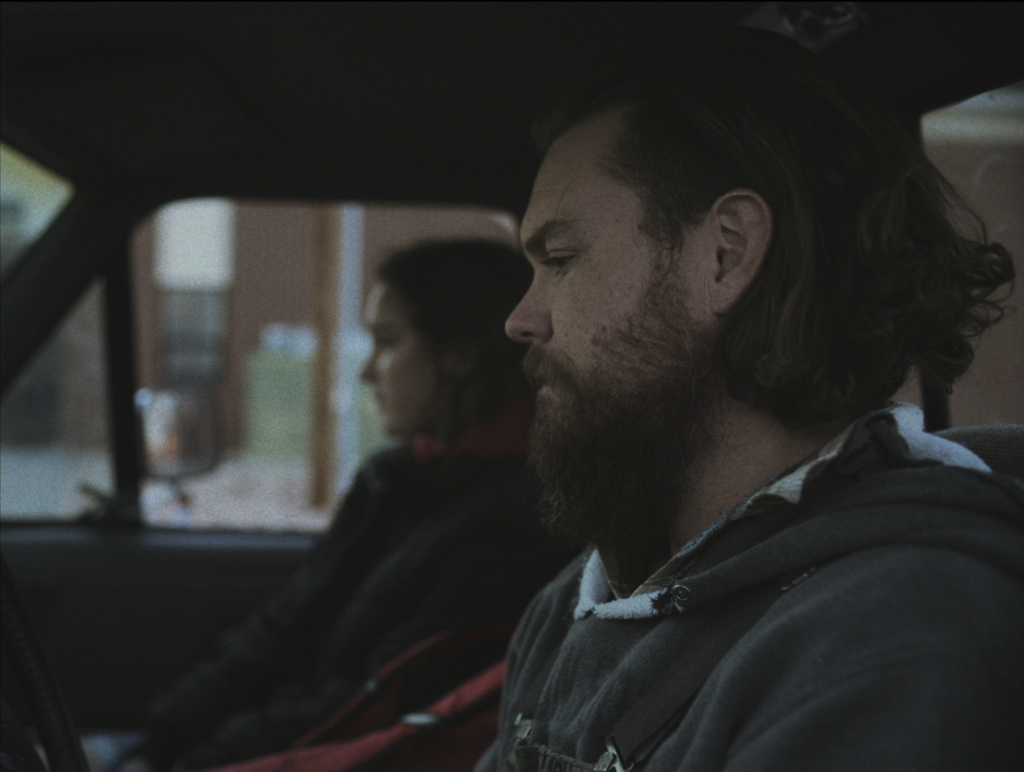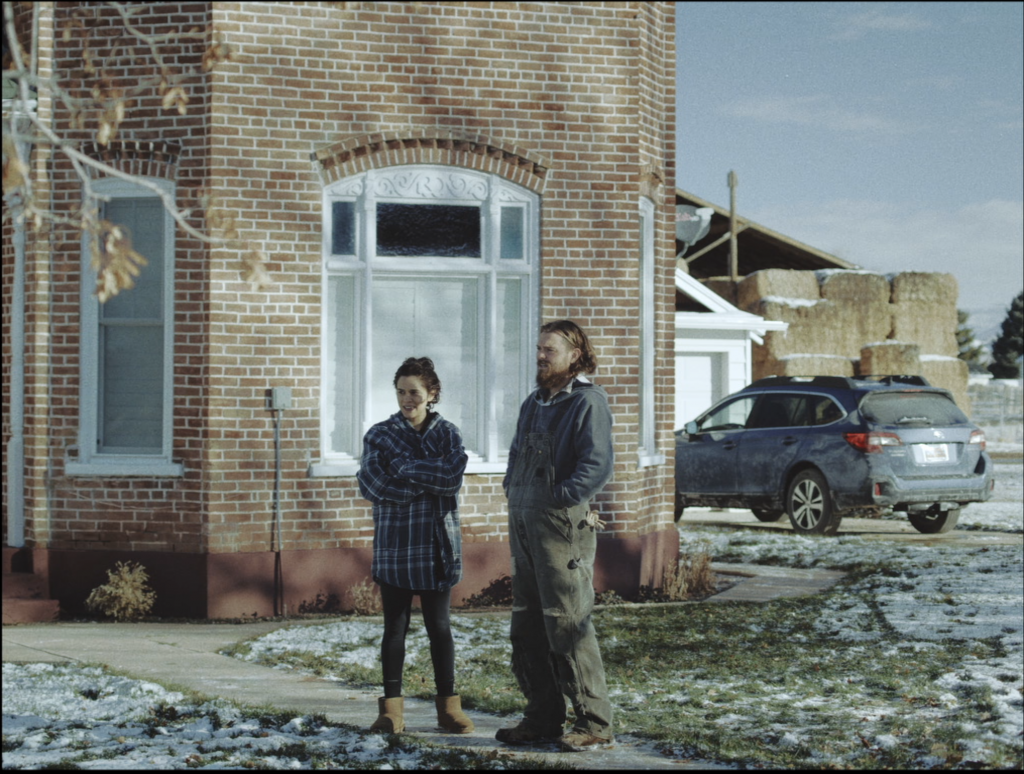May 22, 2021
by Carla Hay

Directed by Robert Machoian
Culture Representation: Taking place in an unnamed U.S. city the dramatic film “The Killing of Two Lovers” features an all-white cast of characters representing the middle-class and working-class.
Culture Clash: A married father, who is in a trial separation from his wife, experiences problems when his wife begins dating another man.
Culture Audience: “The Killing of Two Lovers” will appeal primarily to people who don’t mind watching a mostly slow-paced but well-acted story about marriage and family problems.

The title of “The Killing of Two Lovers” suggests that there’s going to be a murder in the story and that maybe the movie is a thriller. People looking for a murder mystery will be disappointed because it’s not that kind of movie. Instead, the film is a slow-burn character study of a married father who’s separated from his wife and wants to get back together with her, but those plans have been thwarted because she’s dating someone new.
What happens during this love triangle builds up to a big climactic moment that is the standout scene in the film. But since it takes so long to get there, there’s a simmering tension that can be felt underneath the surface at all times. It’s entirely realistic, but it might bore some viewers who might expect the movie to take a more predictable route of family melodramatics that involve married parents who could be on the verge of divorce.
Written and directed by Robert Machoian, “The Killing of Two Lovers” begins with spouses David (played by Clayne Crawford) and Niki (played by Sepideh Moafi) already separated for an unnamed period of time, but it’s implied that it’s been less than a year since they stopped living together. Niki still lives in the marital home, while David now lives with his bedridden, widowed father (played by Bruce Graham), who has respiratory problems and doesn’t have a name in the movie. Based on what David says later in the movie, David and Niki were sweethearts in high school, she got pregnant, they got married soon after graduating from high school, and more recently they began to drift apart.
David and Niki are trying to figure out the future of their relationship while sharing custody of their four children: daughter Jesse (played by Avery Pizzuto) is about 15 or 16 years old; son Alex (played by Arri Graham) is about 10 or 11 years old; son Theo (played by Ezra Graham) is about 7 or 8 years old; and son Bug (played by Jonah Graham) is about 4 or 5 years old. They all live in an unnamed U.S. city, which is in a somewhat rural area that snows. The story is told from David’s point of view.
It’s mentioned later in the movie that David really didn’t want the separation and that it was Niki who asked him to move out of their family home. David still loves Niki and has been trying to get back together with her, but there’s a big problem with that plan: Niki has started dating a man named Derek (played by Chris Coy), and this new relationship might be getting serious. David and Niki had agreed during their separation that they could date other people, but it still hurts David to think that another man could be raising the kids as a possible stepfather.
How much does it bother David that Niki has found a new man? In the film’s striking opening scene, David has snuck back into the house and is pointing a loaded gun at Niki and Derek, who are sound asleep in the bed that David used to share with Niki. David ends up not pulling the trigger, and he quietly sneaks out a house window before anyone sees him. If Niki and Derek had woken up when David was pointing a gun at them, they would’ve seen the deranged and angry look on his face.
It’s the first major hint that David could be emotionally unraveling and might do something extreme or violent. The rest of the story keeps viewers guessing over how far David will go to get back in Niki’s life and get the family back together again. But sometimes, it’s a monotonous journey to get to the point when it’s revealed what will happen to David and his family. The “killing” in the movie’s title could also be a metaphor for the death of a romance and how it affects the couple who used to be happy together.
A great deal of “The Killing of Two Lovers” shows the mundane routines of David’s everyday life, as he tries to adjust to this marital separation. He goes to a local convenience store, where he is friendly with some local townspeople. But when David happens to see Derek there, they silently glare at each other. Derek and his personality remain a mystery until a pivotal point in the movie.
It’s not clear if David has had a career in anything. For now, he seems to be doing odd jobs around the area. A middle-aged widow named Mrs. Staples (played by Barbara Whinnery) hires David to remove large tree branches from her property. As they discuss the fee that she will pay him and how long it will take him to complete the job ($100 a day over a two-week period), David asks Mrs. Staples if she had a good marriage to her late husband Tom.
Mrs. Staples candidly replies that her marriage had a lot of problems. And she says of long-term love relationships: “Love is a feeling. And feelings, they move in, they move out. You and Niki will work it out.”
But will they? When Niki sees David, she hugs him and tells him that she loves him, but she remains vague about her future plans with Derek. She’s also not ready to give David a timetable on when she’ll decide to get back together with him or file for divorce. It’s a limbo that’s making David upset and anxious, but he tries to be a dedicated and loving father to his and Niki’s children.
However, David clashes with Niki over some parenting issues. She gets angry when she finds out that David secretly visited their three sons at 2:30 in the morning at the family home. And both parents are frustrated over how to deal with their teenage daughter Jesse, who is starting to rebel because of David and Niki’s separation. Jesse has been skipping school and wanting to spend less time at home.
Jesse is taking the separation hardest out of all the children. One day, David sees Jesse walking down the road, when she should be in school. He stops his truck and chases after her. She tries to run away, but he catches up to her. While David drives Jesse to school, Jesse’s pent-up resentment comes out in an explosive argument.
Jesse makes it clear that she hates that Niki is dating another man. “Mom’s cheating on you,” she tells David. David replies diplomatically, “No, she’s not. We agreed that we could see other people at this time … I’m not going to make your mom out to be the villan in this thing.” Jesse shouts, “Dad, you need to fight for us!”
On another day, Jesse’s anger comes out again when David has taken her and the three boys to a park during his designated visitation time. David has planned for them to play with toy rockets at the park, but Jesse is bored and frustrated. Instead of participating in this activity, she kicks one of the rockets and insists on being taken back home. When they get back to the family home, something happens that determines the fate of this love triangle that’s been causing much of the turmoil in this family.
All of the actors give emotionally authentic performances, but this movie is mostly a showcase for Crawford’s versatile acting skills. And he delivers in a few scenes that pack a visceral punch. There’s nothing remarkable about the technical production of “The Killing of Two Lovers,” but its biggest strength is in how the actors skillfully portray the angst of people trying to hold their lives together when their relationships are falling apart.
Neon released “The Killing of Two Lovers” in select U.S. cinemas, on digital and VOD on May 14, 2021.
